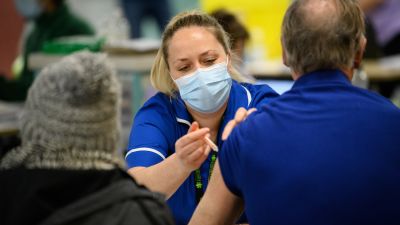'So far so good': Covid vaccine rollout on track to achieve mid-February target, Shapps says

Video report by ITV News Political Correspondent Carl Dinnen
England is on course to achieve its target of vaccinating the four groups most vulnerable to coronavirus by mid-February, the transport secretary has said, providing a glimmer of hope that some restrictions could be eased next month.
Speaking to ITV News, Grant Shapps said the vaccine rollout is "making good progress" toward the aim of offered jabs to the 13.9 million people considered England's most vulnerable by February 15.
"So far so good," he said. "We've vaccinated three million people with their first jabs, that's more than France, Germany, Spain, Italy, combined."
With a month remaining, the minister said the government is "quietly confident" it will achieve its goal.
"All being well, it looks like we will get to those first four categories - that represents 88% of those people who would otherwise die from coronavirus."
Last night Mr Shapps scrambled to announce an urgent ban on travellers from South America, amid concerns a coronavirus variant identified there may not be resistant to vaccines.
While there is no evidence to suggest this is the case, Mr Shapps said he announced the ban as a precaution to ensure the UK's vaccination programme is not disrupted.
"We do think the vaccine will be able to cope with it, we just don't want any further complications right now, and that's why we've brought in this ban, very quickly, which has already come into force today."
One of two new Covid-19 variants from Brazil has been detected in the UK, according to a leading virologist.
ITV News Political Correspondent Libby Wiener has more on the Brazilian variant:
The government hopes it can begin to lift some restrictions after February 15, if it achieves its goal however ministers have repeatedly cautioned that any relaxations would be gradual, with schools set to be the first to reopen.
The UK's vaccine programme involved the rollout of three jabs, Pfizer/BioNTech (in use since 8 December),Oxford/AstraZeneca (in use since 4 January) and Moderna (this vaccine has been approved but doses will not be available in the UK until spring).
Vaccines take two doses to fully inoculate someone, with a first jab said to provide at least 50% protection from Covid-19.
Shapps: This is a 'belt and braces thing...'
As of Wednesday 13 January, the number of people in the UK to have been given a first dose of a Covid-19 vaccine is 2,918,252 - 437,977 of those have had a second dose.
The Joint Committee on Vaccination and Immunisation has said vaccines should be rolled out to these groups in the following order:
1 - Residents in a care home for older adults and their carers (800,000 people) 2 - Those aged 80 and over and frontline health and social care workers (a total of 7.1 million people in this group: 3.3m over 80s, 2.4m healthcare workers, 1.4m social care workers) 3 - Those aged 75 and over (2.3 million) 4 - Those aged 70 and over and clinically extremely vulnerable individuals (3.2 million) 5 - Those aged 65 and over (2.9 million) 6 - All individuals aged 16 to 64 with underlying health conditions which put them at higher risk of serious disease and mortality (7.3 million) 7 - Those aged 60 and over (1.8 million) 8 - Those aged 55 years and over (2.4 million) 9 - Those aged 50 years of age and over (2.8 million)
Prime Minister Boris Johnson has previously said some parts of the country are doing "incredibly well" in vaccinating people, but progress was "less good" in other areas.On Wednesday, the PM told MPs that "well over 50%" of over 80s in the North East and Yorkshire had been given their first jab.
By contrast about three in 10 people aged 80 and over in eastern England have had their first jab, with a similar proportion in London.
Listen to the ITV News Politics Podcast: